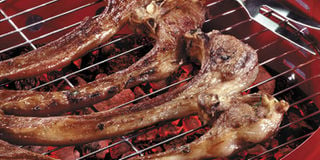WANNER: How the city of Jo’burg mirrors African literature

If roast meat is your thing, you have not lived until and unless you have eaten some meat in a good old South African braai. And no, this is not just my opinion. PHOTO| FILE| NATION MEDIA GROUP
What you need to know:
- Forget Ole Polos or whatever you have heard about Louisiana barbecues.
- If roast meat is your thing, you have not lived until and unless you have eaten some meat in a good old South African braai. And no, this is not just my opinion.
- Once in a debate with my friend Helon Habila, he stated that South Africans were lousy cooks.
I spent my holidays with my South African side of the family this year. I visited family and friends in places like Orlando West Extension and Protea North, both in Soweto, as well as towns like Bloemfontein and Kimberley. One of the highlights for dude was a visit to partake in some chisa nyama and drinks with good friends. Forget Ole Polos or whatever you have heard about Louisiana barbecues. If roast meat is your thing, you have not lived until and unless you have eaten some meat in a good old South African braai. And no, this is not just my opinion. Once in a debate with my friend Helon Habila, he stated that South Africans were lousy cooks. “The only thing you know how to do well is braai.” He had at least acknowledged that we were braai masters — a generous compliment coming from a Nigerian to a South African. But it still hurt, you know? So while I should have walked away enjoying the compliment about my compatriots’ ability to make a decent braai, I hit back with “we are better writers, though.”
Another time, I took a vegetarian friend who was visiting Jo’burg to a braai and who had been vegan for five years and, by the end of the day, it was not roasted vegetables that they were eating. That’s just how enticing the smell of the pork chops, lamb chops, and real South African beef ribs were to her. But back to dude. For a very long time, I had condescended to tell him that he cannot claim to have been to Johannesburg until he has been to my favourite chisa nyama joint, Busy Corner. For a very long time, too, for some reason every time we are there, he has failed to make it due to any bunch of reasons. This time around, because we had sufficient time, we made it a priority. And he almost missed it as he only made it there in his last three days in Jozi.
Busy Corner is a place that will resonate with many Nairobians as much as it resonates with Joburgers: music, meat, drinks and friends. Sadly, when he indicated his intention to visit, dude had been warned that this could be a deadly place by a friend of ours. After all, according to our mutual friend, the venue is in a Johannesburg township. Fortunately, he was willing to take the risk and we all ended up having a great time meeting with friends.
This fear of a Jo’burg that is said to be dangerous while other cities with worse crime statistics like Cape Town — which is, in fact, South Africa’s murder capital — had me thinking. In some ways, Busy Corner, to our old friend, and Johannesburg by extension to many people, is like African literature. There is a certain belief by those who want to speak of it without engaging with it properly on what it is.
“Oh,” someone will say authoritatively, “I can’t really engage with African literature because it is too literary and serious. When I read,” our expert will say, “I want to be able to escape or laugh without not always dealing with portentous issues.”
It is at such times I am always tempted to ask when the reader last read works written by Africans. Because how can anyone who is aware of the works of Aidoo, Mbue, Omotoso, Golakai, Adenle, Mhlongo, Chikoti, Eltahawy among others — and these are just writers writing in the English language — dare suggest that African literature is one thing and one thing only?
Similarly, it is only someone who has not bothered to venture beyond the airport or Sandton who can claim that Johannesburg is the same. Now. Is there crime in Johannesburg? Of course there is. It’s a metropole. There is crime there as much as there is anywhere else in any other big city. But just like the best way for me to be safe when I am in any city is to act like I belong to it, the best way to truly be able to know our continent’s literature is to read widely. A person who has only been to Sandton and thinks that is Johannesburg has about as much of a right to opine about that city as a person who only ever read one book by Chinua Achebe — brilliant as he was — and thinks that is all there is to African literature. It’s difficult to take this person seriously.
Zukiswa Wanner is a South African author based in Kenya. [email protected]





